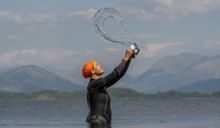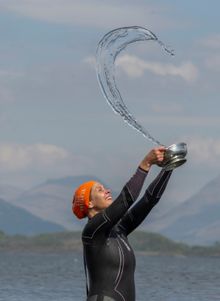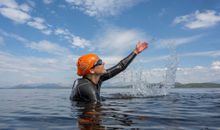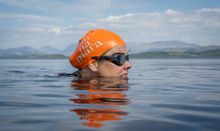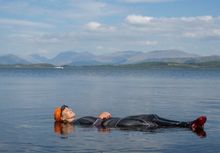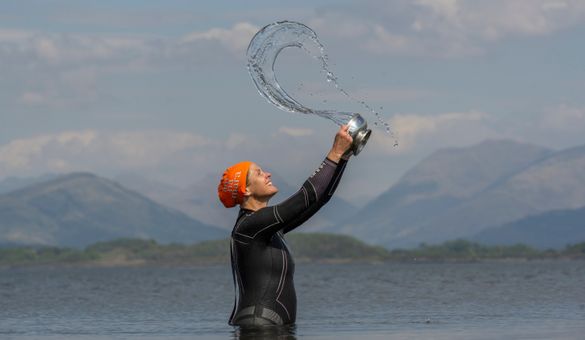 12 Jun 2024
12 Jun 2024
Tags: Scotland, wildaboutargyll, argyll, Islands, Gaelic, Culture, Heritage, Wellbeing, wellness, Wild Swimming, drumming

A new drive has been launched to revive the ancient Gaelic healing properties in the heartland of the historic kingdom of Dál Riata – the coast of the Gaels - also known as Argyll and the Isles, on Scotland's west coast.
The importance of connecting to nature to boost our wellbeing has been well documented through numerous studies in recent years, but the Gaels have known and embraced these healing properties for thousands of centuries, as recorded throughout history and through Gaelic language and place names. More recently, the 2021 Scottish Social Attitudes Survey revealed that 70 per cent of those learning Gaelic believed it contributed to their wellbeing.
Now members of the Argyll and Isles Tourism Cooperative have come together to ensure that visitors and locals alike can experience Dál Riata's ancient and unique naturally restorative properties for themselves.
Launching the drive, Cathy Craig, CEO of the Argyll and Isles Tourism Cooperative (wildaboutargyll.co.uk) said: “With our breath-taking natural environment, exceptional fresh air, rich flora and fauna, and outstanding array of water sources - from the Atlantic Ocean and lochs to rivers and waterfalls - it is easy to see why the Gaels would make our destination the capital of their ancient Dál Riata heartland. We've joined forces with our members in a bid to put these ancient restorative properties and our important Gaelic heritage back on the map.
“We would encourage visitors to follow in the footsteps of the ancient Gaels to really discover the wellbeing benefits that connecting with nature and Gaelic culture can bring. And with a wealth of truly blissful wellbeing experiences for visitors still to experience in Argyll and the Isles to this day, there are so many ways to do this. Argyll and the Isles is truly Scotland's Wellbeing Coast.”
Open water swimming coach, Emma MacDonald agrees. Having been a visitor for over two decades she now calls Tobermory on the Isle of Mull home. Drawn by its outstanding natural beauty and the warmth of the local community, Emma moved to the island with her husband John, who is a native “Muileach” (the Gaelic name for people from Mull) and their two sons. In 2023 they launched Wild Hebridean Swimming providing wild swimming retreats on the Isles of Mull & Iona, where Saint Columba, who was highly regarded by the Gaels and the Picts, established a monastery that played a key role in the spread of Celtic Christianity throughout northern Britain.
On her retreats, Emma arranges for her swimmers to visit local Ardalanish Weavers where they can see a traditional working loom. And new for 2024 is a visit by Cuigeal, a Sgioba Luaidh (a waulking group) consisting of members of Còisir Ghàidhlig an Eilein Mhuilich (the Isle of Mull Gaelic Choir), where guests are treated to a re-enactment of waulking, or 'fulling', the process by which tweed is shrunk in order to make it waterproof. This process was long and wearisome and was accompanied by singing many rhythmic songs to lessen the boredom. Speaking on the launch of the Argyll and Isle's Tourism Cooperative's drive today, Emma said: “I am delighted to be part of an initiative that raises the awareness of the Gaelic language and culture. As well as enjoying the landscape, people really appreciate seeing how people used to live and of course still do.”
Àdhamh Ó Broin, Gaelic Culture Officer for the Culture, Heritage & Arts Assembly, Argyll and the Isles (CHARTS) added: “In a world where people find themselves cut off from the rhythms of the natural world, it is increasingly important to return to the practices of our ancestors and to the land in which we experience symbiosis with nature. Argyll is choc-full of opportunity for this. Whether people have Gaelic roots or not, exposure to Gaelic language and culture allows people to think about and explore their own cultural legacy.
“Drawing from the ancestral well can bring enormous health benefits as we channel thousands of years of wisdom which has often become lost in the modern, western world. There is nothing quite like the feeling of bare feet on the living earth and Gaelic language in Argyll has been a descriptive tool of this relationship for hundreds, if not thousands of years. Come and visit, take off your socks and shoes, walk in sacred places that have held spiritual resonance for centuries, invest your energy here and drink from the Gaelic cultural well."
The new 'maitheis' or wellbeing drive by The Argyll and Isles Tourism Cooperative also recognises the wide range of studies over the years (such as the Nord-Trondelag Health Study) that have evidenced the real difference that culture, museums, heritage sites, galleries and art workshops can make to boosting mental wellbeing.
Other members of the Argyll and Isles Tourism Cooperative offering visitors unique opportunities to boost their wellbeing or connect to nature or Gaelic culture or heritage include:
- The Royal National Mòd (11 to 19 October) – festival-goers can relax and unwind to the soothing sounds of Gaelic songs and voices at Scotland's premier Gaelic festival, which takes place in Oban again this year. Organised by An Comunn Gàidhealach (The Highland Association), which was founded in Oban in 1891, The Mod represents 'an annual opportunity for Gaels and non-Gaels to gather and renew old friendships as well as forging new ones'. The event features competitions across a range of disciplines, including music, song and dance, and performances from some of Scotland's top traditional musicians and Gaelic singers.
- The Pierhouse Hotel – this highly-acclaimed hotel, located in the quiet village of Port Appin on the shores of Loch Linnhe in Argyll, is offering guests the opportunity to celebrate Gaelic culture on wild swimming adventures with Dan the Merman. In addition to this, the hotel is running 'Forage and Feast' breaks with The Wild Cookein June and September, which will connect visitors with nature through food foraging.
- New for 2024, The Wild Cooke is also hosting a late summer foraging and feasting weekend (9 to 11 August 2024) at WildLuing to celebrate local produce on the Isle of Luing. Guests can enjoy a light buffet lunch incorporating some of their own foraged finds, then relax in their luxury self-catering 'WildSuites; overlooking the sea, seals and otters in Torsa Bay. WildLuing is based on the shoreline and it is a great time of year to explore the shoreline and hedgerows for wild edibles which Luing has in abundance.
- Stravaigin Sailing and Provident Sailing offer guided wild swimming and sailing adventures.
- Heathery Heights leads sustainable foraging adventures, guided walks and outdoor experiences across Argyll & the Isles - from the less frequented hills and stunning rugged coastal paths with the chance to see a wide range of birds and sea life to ancient historical sites; and A' choille-uisge Cheilteach (The Celtic Rain Forest). Due to its unique position on the Gulf Stream, Argyll is known for its special habitats of Atlantic temperate rainforest.
- Kilmartin Museum (Cille Mhàrtainn in Gaelic) – situated close to what was once the centre of Gaelic civilisation (Dunadd Fort - thought to be the capital of Dál Riata), Kilmartin Museum reopened in 2023 after a multimillion-pound refurbishment in one of Scotland's richest prehistoric landscapes. Kilmartin Museum houses a nationally significant collection, which includes some panels describing the ancient belief in the restorative power of nature.
- Historic Kilmun (Cille Mhunna in Gaelic) - Historic Kilmun is a small village located on the shores of the Holy Loch, just north of Dunoon on the beautiful Cowal Peninsula. Founded by Gaelic monk St Fintan Munnu, the village was a monastic community in the 7th century. It is surrounded by Sites of Special Scientific Interest (SSSI), which are rich in wildlife, including otters, eagles and ravens, bats, roe deer, red deer, red squirrels, pine-martens, seals, eider ducks and many other species. The perfect place to unwind.
- Auchindrain Historic Township - Sheltered in the hills of Mid Argyll lies a hidden gem, a sole survivor of a kind of rural settlement where many residents spoke Gaelic and worked the land together. Up until the 1800s most people in rural Scotland lived in places like Auchindrain. In 2012, part of a much-thumbed Gaelic Bible was found in Auchindrain, tucked into a gap in the wall above the kitchen sink along with some sheets of newspaper from 1937. Today visitors can reconnect with the site using guide tablets in many different languages including Gaelic and English.
- Blissful places to stay - The destination is home to a number of luxury spa experiences and properties which allow guests to immerse themselves in nature, including:
- Portavadie (Port a' Mhadaidh in Gaelic) - a luxury spa resort surrounded by idyllic views of Loch Fyne and surrounding mountains, where visitors can explore nearby Gaelic pilgrim trails and soak in the ancient Celtic heritage.
- Wildluing (pronounced “Wilding”) - luxury self-catering WildSuites, designed and built by local craftsmen on Isle of Luing, looking out over otters and seals in Torsa bay. The island enjoys the shortest ferry crossing in Scotland (3 minutes from mainland to island).
- Kabn Company, a luxury off-grid retreat nestled on the shores of Loch Fyne, offers a range of eco cabins which have been architecturally designed to immerse guests in nature, whilst maintaining privacy, seclusion and tranquillity.
- Soulfull Living Academy - connecting people to the ancient traditions of indigenous people, the Academy offers a range of shamanic experiences, such as their Drum Birthing Retreat where guests craft their own drums and beaters and then go on to enjoy the transformative and restorative feeling of playing them. Drums have been used for thousands of years by the Gaels, as an instrument for making music, for celebration, dance, vision seeking and ritual.
Welcoming the drive and encouraging more tourism businesses to celebrate Gaelic culture, VisitScotland Regional Director David Adams McGilp said: “We know our history and culture are among the main reasons people choose Scotland as a destination and the Gaelic language plays a distinct role in our heritage, identity and culture. Visitors are also looking to connect with local communities and immerse themselves in our culture to boost their wellbeing. Gaelic can provide an extra layer to the authentic Scottish experience and we would encourage businesses in Argyll & Isles to consider maximising the opportunities that Gaelic brings and adding an element of Gaelic language to their offering.”
For more information about wellbeing experiences and connecting to Gaelic culture in Argyll and the Isles visit wildaboutargyll.co.uk
